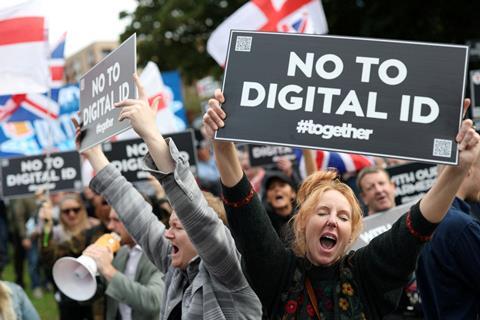At the recent Labour Party conference, Keir Starmer announced plans to introduce a digital ID card. Ostensibly touted as a solution to the UK’s current immigration crisis, some Christians wonder if it’s linked to end times prophecy. Chris Follett explains

The question of proving one’s identity is back in the news, following the government’s announcement that it wants to resurrect the identity card scheme.
At the recent Labour Party conference, Keir Starmer positioned this as a means of making it easier for citizens - and the authorities - to determine who’s who.
What is the background to the ID card announcement?
immigration - and particularly what is termed by some as illegal or irregular immigration - has worked its way to the top of the political agenda over the summer. The government is under significant pressure on this issue.
In response, Labour have argued that the introduction of identity cards (in the form of a smartphone app that functions as a digital ID card), will better enable the authorities to monitor the population. They say it would also streamline other processes such as DBS checks.
The previous Labour government under Tony Blair proposed a similar scheme in the early 2000s. In fact, in 2006 the UK Identity Cards Act was passed into law, to pave the way for the roll-out of these cards across the UK. At the time this was contentious and when the Conservative/Liberal Democrat coalition came to power in 2010, they repealed the legislation.
Why do some people object to ID cards?
There are numerous objections to such a proposal, which were aired extensively in 2006. At the top of the list is the cost of implementing and running a scheme likely to involve the creation and maintenance of an entirely new database.
Practicalities are a second concern – not everyone has a smartphone or wants to carry them wherever they go.
With the recent hacking scandals at Marks and Spencer, The Co-op and Jaguar Landrover, the question of data security also looms larger today than in 2006. The risks and potentially disastrous consequences of a serious data breach are significant. Do we trust our government to hold (even more) digital data on us? Would such a system be susceptable to hacking attempts from our enemies?
Finally, there are broader civil liberties concerns – do we really need yet more state oversight, monitoring and control over our lives?
Does the Bible have anything to say about this issue?
Readers won’t be surprised to learn that there is no specific reference to identity cards in the scriptures! However, there is a rather strange and infamous incident recorded in the Old Testament where David is “incited” by Satan to take a census of the people (1 Chronicles 21). Samuel records that the Lord’s response is to send a plague upon the people of Israel.
Jewish and Christian scholars offer differing interpretations of this event but there is some consensus that David acted presumptuously, putting his trust in human strength and agency rather than relying upon the Lord.
While it’s hard to draw any direct parallels from this incident (it’s a stretch to say this scripture forbids modern governments from counting their people) it does highlight the importance of motive when a ruler - or the state - attempts to exert control over the people. Does the government genuinely believe the introduction of ID cards will better society, or is it simply a knee-jerk response to a current political problem?
Are ID cards the Mark of the Beast?
Some Christians may also wonder whether this is another step along the path towards the system of control over the population described in the book of Revelation. This is mentioned in Revelation 13 where all people are forced “to receive a mark on their right hands or on their foreheads, so that they could not buy or sell unless they had the mark, which is the name of the beast or the number of its name” (v16-17).
While the current proposal is for an ID card initially stored on my phone, will it end up being implanted in my hand or forehead?
As I have argued in previous articles, trying to map events described in Revelation to real world happenings is a highly speculative business.
This particular reference may well refer to an actual end-times government, which will be a particular challenge to people living at that time. However, a broader view of these verses understands them as describing characteristics of totalitarian regimes in general. And we see actual manifestations of this in our world today, notably in North Korea and China, where citizens are subject to an ever-increasing burden of surveillance and control over their lives.
While Labour’s latest proposal is very unlikely to be a direct fulfilment of Revelation 13, some Christians will nevertheless worry the move toward digital ID cards is opening the door to systems, structures and technologies which could ultimately lead toward a future Mark of the Beast scenario.
How should Christians respond?
In the book of Acts, which describes the founding of the fledgling Church, aside from the prevalence of the miraculous, we see a remarkable demonstration of community.
The Church, at its best, functions as a society where members are fully conversant with the responsibilities they have to others in the community.
This presents a compelling Christian case for society, and society necessitates that government will have to take decisions and implement policy that are for the betterment of the whole.
There are many examples of government failure in which people’s betterment was anything but the outcome. However, we should resist the temptation to view all efforts by government to implement policy with scepticism. This is an increasing tendency of those whose views are informed by libertarian philosophy as much as Christian theology.
Let us remember that in the scriptures, both Paul and Peter are emphatic that the institution of government is given by God for the good of all, and as such should be respected by believers (Romans 13:1-7, 1 Peter 2:13-17).






































2 Readers' comments